MGBBT1TEN - Tourism Environment and Industry: A UK Perspective
VerifiedAdded on 2023/06/07
|9
|2465
|315
Essay
AI Summary
This essay provides a comprehensive overview of sustainable tourism within the UK, addressing its definition, principles, and application in the context of UK tourism development. It identifies the roles of various stakeholders in the decision-making process and analyzes macro-environmental factors that positively and negatively impact sustainable tourism. The essay also includes a competitive analysis of the micro-environment using Porter's Five Forces, examining factors influencing the demand for UK tourism products. Furthermore, it discusses motivational factors, both push and pull, that drive tourist behavior. The conclusion emphasizes the feasibility of sustainable tourism for the industry's future, highlighting the importance of adapting to technological advancements and addressing challenges related to limited resources and competition. This analysis demonstrates the interdependence between tourism, government support, and overall industry development in the UK.
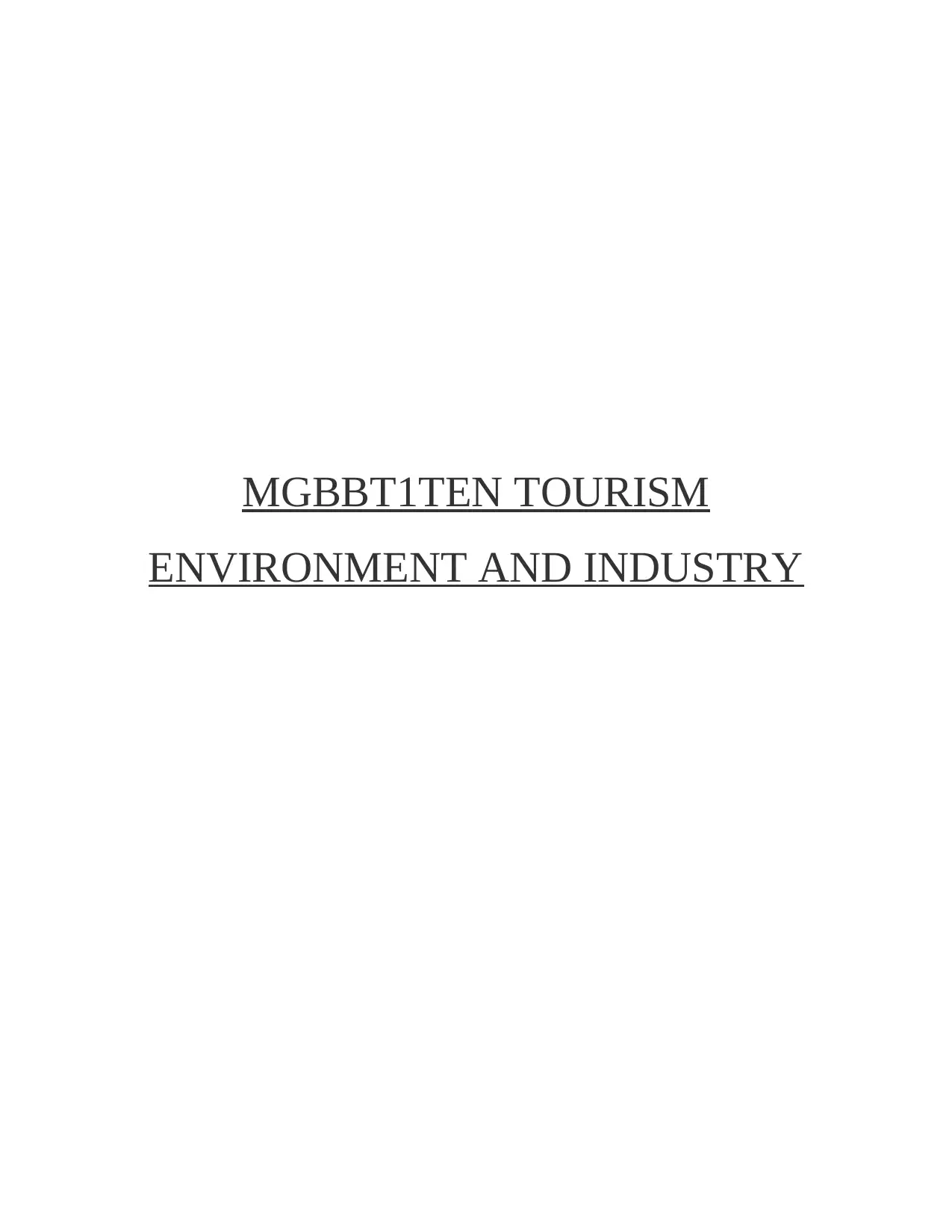
MGBBT1TEN TOURISM
ENVIRONMENT AND INDUSTRY
ENVIRONMENT AND INDUSTRY
Paraphrase This Document
Need a fresh take? Get an instant paraphrase of this document with our AI Paraphraser
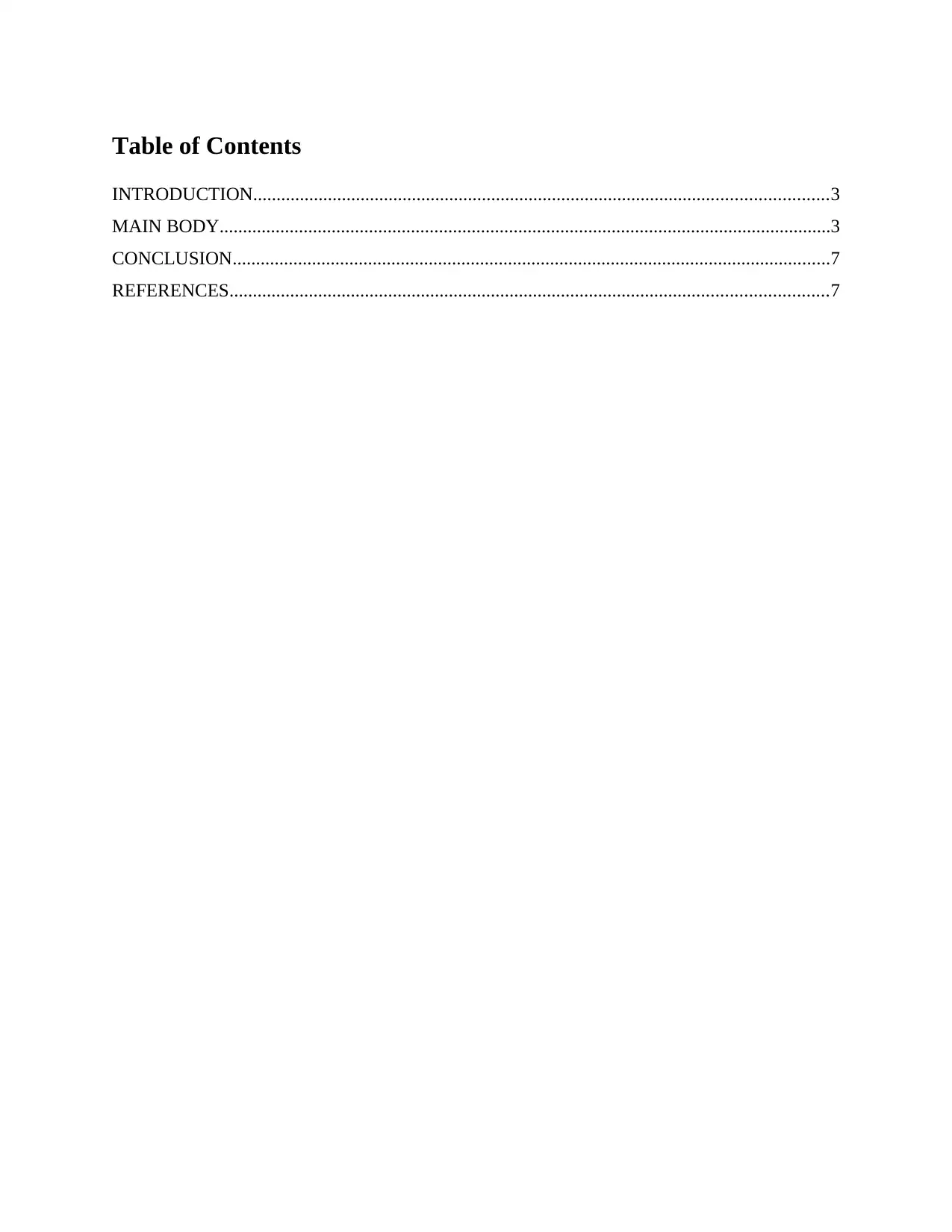
Table of Contents
INTRODUCTION...........................................................................................................................3
MAIN BODY...................................................................................................................................3
CONCLUSION................................................................................................................................7
REFERENCES................................................................................................................................7
INTRODUCTION...........................................................................................................................3
MAIN BODY...................................................................................................................................3
CONCLUSION................................................................................................................................7
REFERENCES................................................................................................................................7
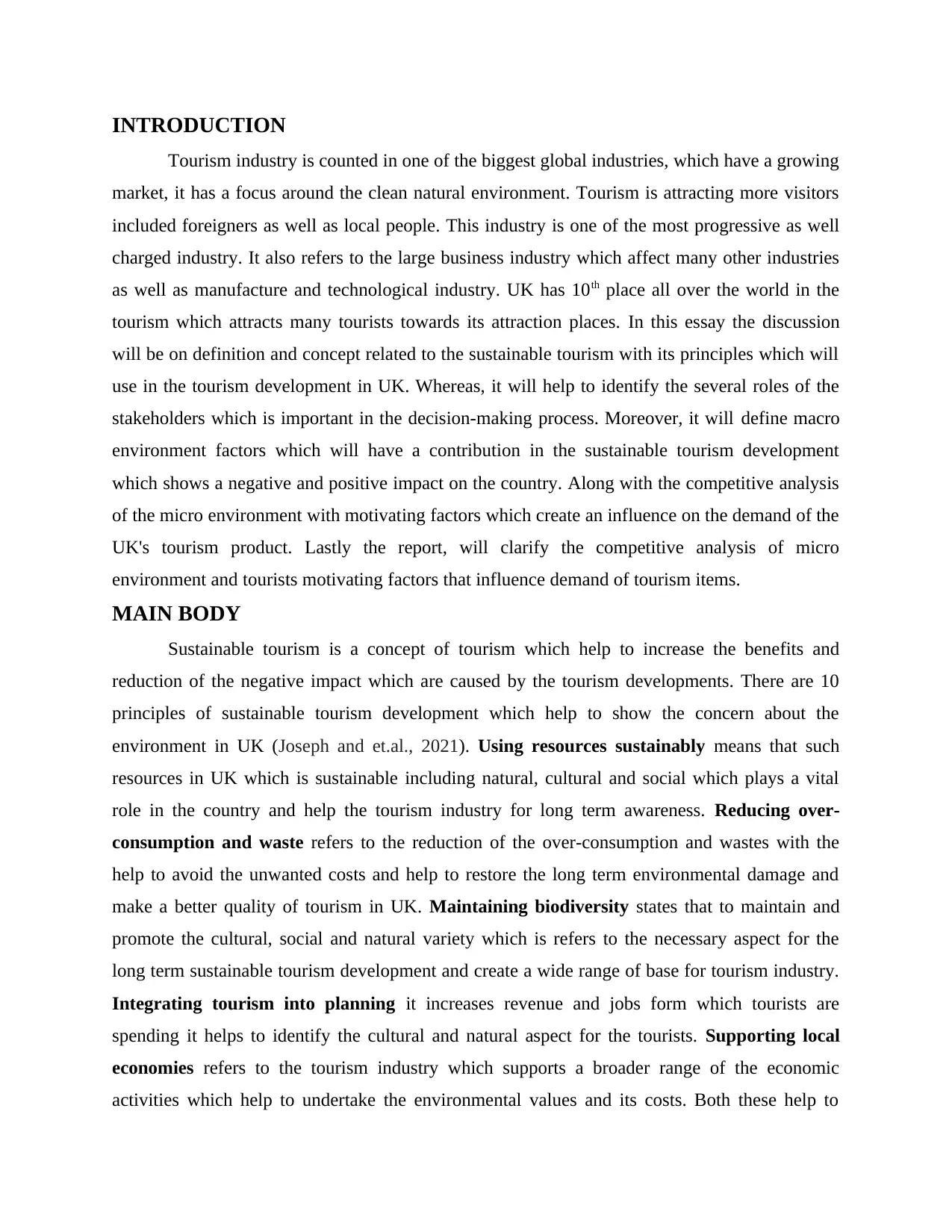
INTRODUCTION
Tourism industry is counted in one of the biggest global industries, which have a growing
market, it has a focus around the clean natural environment. Tourism is attracting more visitors
included foreigners as well as local people. This industry is one of the most progressive as well
charged industry. It also refers to the large business industry which affect many other industries
as well as manufacture and technological industry. UK has 10th place all over the world in the
tourism which attracts many tourists towards its attraction places. In this essay the discussion
will be on definition and concept related to the sustainable tourism with its principles which will
use in the tourism development in UK. Whereas, it will help to identify the several roles of the
stakeholders which is important in the decision-making process. Moreover, it will define macro
environment factors which will have a contribution in the sustainable tourism development
which shows a negative and positive impact on the country. Along with the competitive analysis
of the micro environment with motivating factors which create an influence on the demand of the
UK's tourism product. Lastly the report, will clarify the competitive analysis of micro
environment and tourists motivating factors that influence demand of tourism items.
MAIN BODY
Sustainable tourism is a concept of tourism which help to increase the benefits and
reduction of the negative impact which are caused by the tourism developments. There are 10
principles of sustainable tourism development which help to show the concern about the
environment in UK (Joseph and et.al., 2021). Using resources sustainably means that such
resources in UK which is sustainable including natural, cultural and social which plays a vital
role in the country and help the tourism industry for long term awareness. Reducing over-
consumption and waste refers to the reduction of the over-consumption and wastes with the
help to avoid the unwanted costs and help to restore the long term environmental damage and
make a better quality of tourism in UK. Maintaining biodiversity states that to maintain and
promote the cultural, social and natural variety which is refers to the necessary aspect for the
long term sustainable tourism development and create a wide range of base for tourism industry.
Integrating tourism into planning it increases revenue and jobs form which tourists are
spending it helps to identify the cultural and natural aspect for the tourists. Supporting local
economies refers to the tourism industry which supports a broader range of the economic
activities which help to undertake the environmental values and its costs. Both these help to
Tourism industry is counted in one of the biggest global industries, which have a growing
market, it has a focus around the clean natural environment. Tourism is attracting more visitors
included foreigners as well as local people. This industry is one of the most progressive as well
charged industry. It also refers to the large business industry which affect many other industries
as well as manufacture and technological industry. UK has 10th place all over the world in the
tourism which attracts many tourists towards its attraction places. In this essay the discussion
will be on definition and concept related to the sustainable tourism with its principles which will
use in the tourism development in UK. Whereas, it will help to identify the several roles of the
stakeholders which is important in the decision-making process. Moreover, it will define macro
environment factors which will have a contribution in the sustainable tourism development
which shows a negative and positive impact on the country. Along with the competitive analysis
of the micro environment with motivating factors which create an influence on the demand of the
UK's tourism product. Lastly the report, will clarify the competitive analysis of micro
environment and tourists motivating factors that influence demand of tourism items.
MAIN BODY
Sustainable tourism is a concept of tourism which help to increase the benefits and
reduction of the negative impact which are caused by the tourism developments. There are 10
principles of sustainable tourism development which help to show the concern about the
environment in UK (Joseph and et.al., 2021). Using resources sustainably means that such
resources in UK which is sustainable including natural, cultural and social which plays a vital
role in the country and help the tourism industry for long term awareness. Reducing over-
consumption and waste refers to the reduction of the over-consumption and wastes with the
help to avoid the unwanted costs and help to restore the long term environmental damage and
make a better quality of tourism in UK. Maintaining biodiversity states that to maintain and
promote the cultural, social and natural variety which is refers to the necessary aspect for the
long term sustainable tourism development and create a wide range of base for tourism industry.
Integrating tourism into planning it increases revenue and jobs form which tourists are
spending it helps to identify the cultural and natural aspect for the tourists. Supporting local
economies refers to the tourism industry which supports a broader range of the economic
activities which help to undertake the environmental values and its costs. Both these help to
⊘ This is a preview!⊘
Do you want full access?
Subscribe today to unlock all pages.

Trusted by 1+ million students worldwide
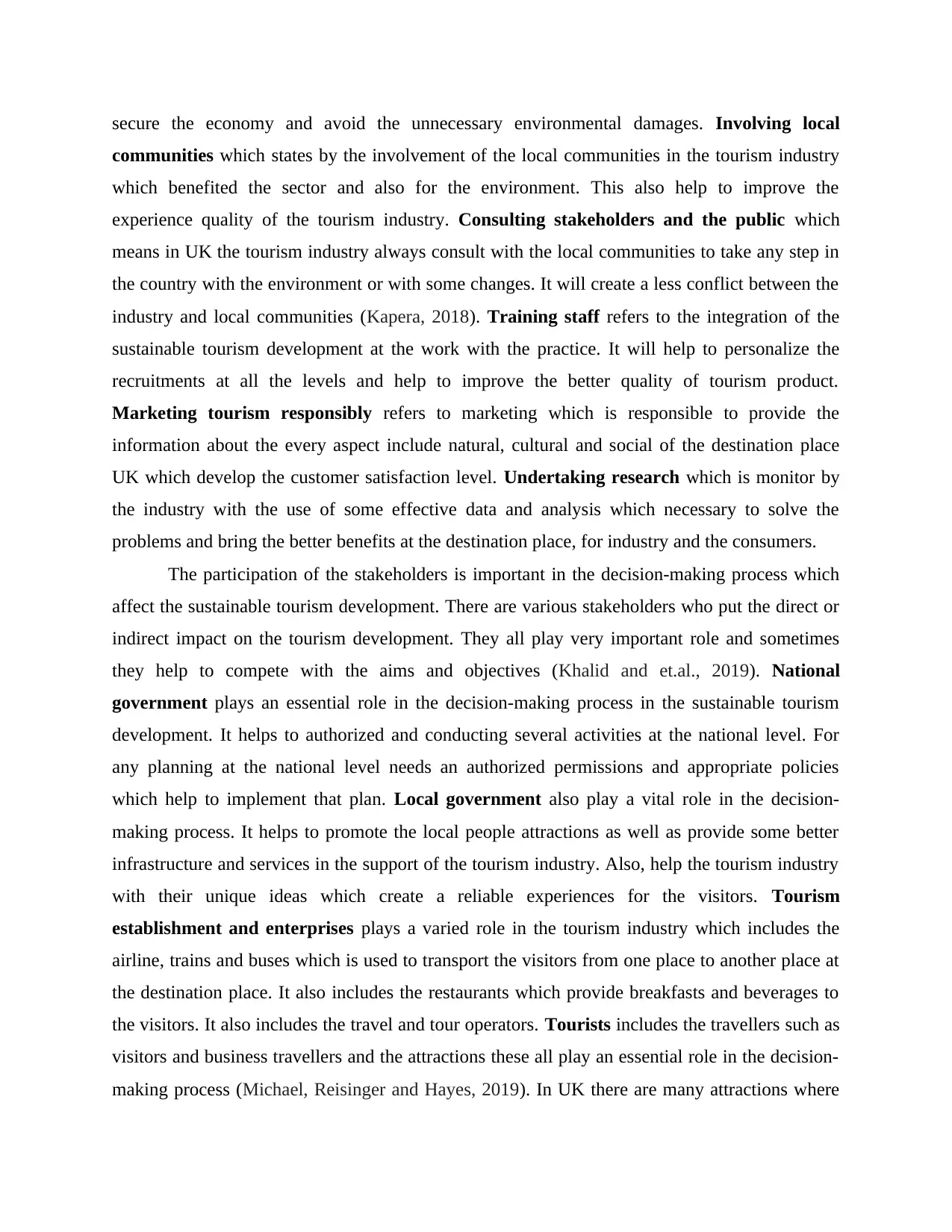
secure the economy and avoid the unnecessary environmental damages. Involving local
communities which states by the involvement of the local communities in the tourism industry
which benefited the sector and also for the environment. This also help to improve the
experience quality of the tourism industry. Consulting stakeholders and the public which
means in UK the tourism industry always consult with the local communities to take any step in
the country with the environment or with some changes. It will create a less conflict between the
industry and local communities (Kapera, 2018). Training staff refers to the integration of the
sustainable tourism development at the work with the practice. It will help to personalize the
recruitments at all the levels and help to improve the better quality of tourism product.
Marketing tourism responsibly refers to marketing which is responsible to provide the
information about the every aspect include natural, cultural and social of the destination place
UK which develop the customer satisfaction level. Undertaking research which is monitor by
the industry with the use of some effective data and analysis which necessary to solve the
problems and bring the better benefits at the destination place, for industry and the consumers.
The participation of the stakeholders is important in the decision-making process which
affect the sustainable tourism development. There are various stakeholders who put the direct or
indirect impact on the tourism development. They all play very important role and sometimes
they help to compete with the aims and objectives (Khalid and et.al., 2019). National
government plays an essential role in the decision-making process in the sustainable tourism
development. It helps to authorized and conducting several activities at the national level. For
any planning at the national level needs an authorized permissions and appropriate policies
which help to implement that plan. Local government also play a vital role in the decision-
making process. It helps to promote the local people attractions as well as provide some better
infrastructure and services in the support of the tourism industry. Also, help the tourism industry
with their unique ideas which create a reliable experiences for the visitors. Tourism
establishment and enterprises plays a varied role in the tourism industry which includes the
airline, trains and buses which is used to transport the visitors from one place to another place at
the destination place. It also includes the restaurants which provide breakfasts and beverages to
the visitors. It also includes the travel and tour operators. Tourists includes the travellers such as
visitors and business travellers and the attractions these all play an essential role in the decision-
making process (Michael, Reisinger and Hayes, 2019). In UK there are many attractions where
communities which states by the involvement of the local communities in the tourism industry
which benefited the sector and also for the environment. This also help to improve the
experience quality of the tourism industry. Consulting stakeholders and the public which
means in UK the tourism industry always consult with the local communities to take any step in
the country with the environment or with some changes. It will create a less conflict between the
industry and local communities (Kapera, 2018). Training staff refers to the integration of the
sustainable tourism development at the work with the practice. It will help to personalize the
recruitments at all the levels and help to improve the better quality of tourism product.
Marketing tourism responsibly refers to marketing which is responsible to provide the
information about the every aspect include natural, cultural and social of the destination place
UK which develop the customer satisfaction level. Undertaking research which is monitor by
the industry with the use of some effective data and analysis which necessary to solve the
problems and bring the better benefits at the destination place, for industry and the consumers.
The participation of the stakeholders is important in the decision-making process which
affect the sustainable tourism development. There are various stakeholders who put the direct or
indirect impact on the tourism development. They all play very important role and sometimes
they help to compete with the aims and objectives (Khalid and et.al., 2019). National
government plays an essential role in the decision-making process in the sustainable tourism
development. It helps to authorized and conducting several activities at the national level. For
any planning at the national level needs an authorized permissions and appropriate policies
which help to implement that plan. Local government also play a vital role in the decision-
making process. It helps to promote the local people attractions as well as provide some better
infrastructure and services in the support of the tourism industry. Also, help the tourism industry
with their unique ideas which create a reliable experiences for the visitors. Tourism
establishment and enterprises plays a varied role in the tourism industry which includes the
airline, trains and buses which is used to transport the visitors from one place to another place at
the destination place. It also includes the restaurants which provide breakfasts and beverages to
the visitors. It also includes the travel and tour operators. Tourists includes the travellers such as
visitors and business travellers and the attractions these all play an essential role in the decision-
making process (Michael, Reisinger and Hayes, 2019). In UK there are many attractions where
Paraphrase This Document
Need a fresh take? Get an instant paraphrase of this document with our AI Paraphraser
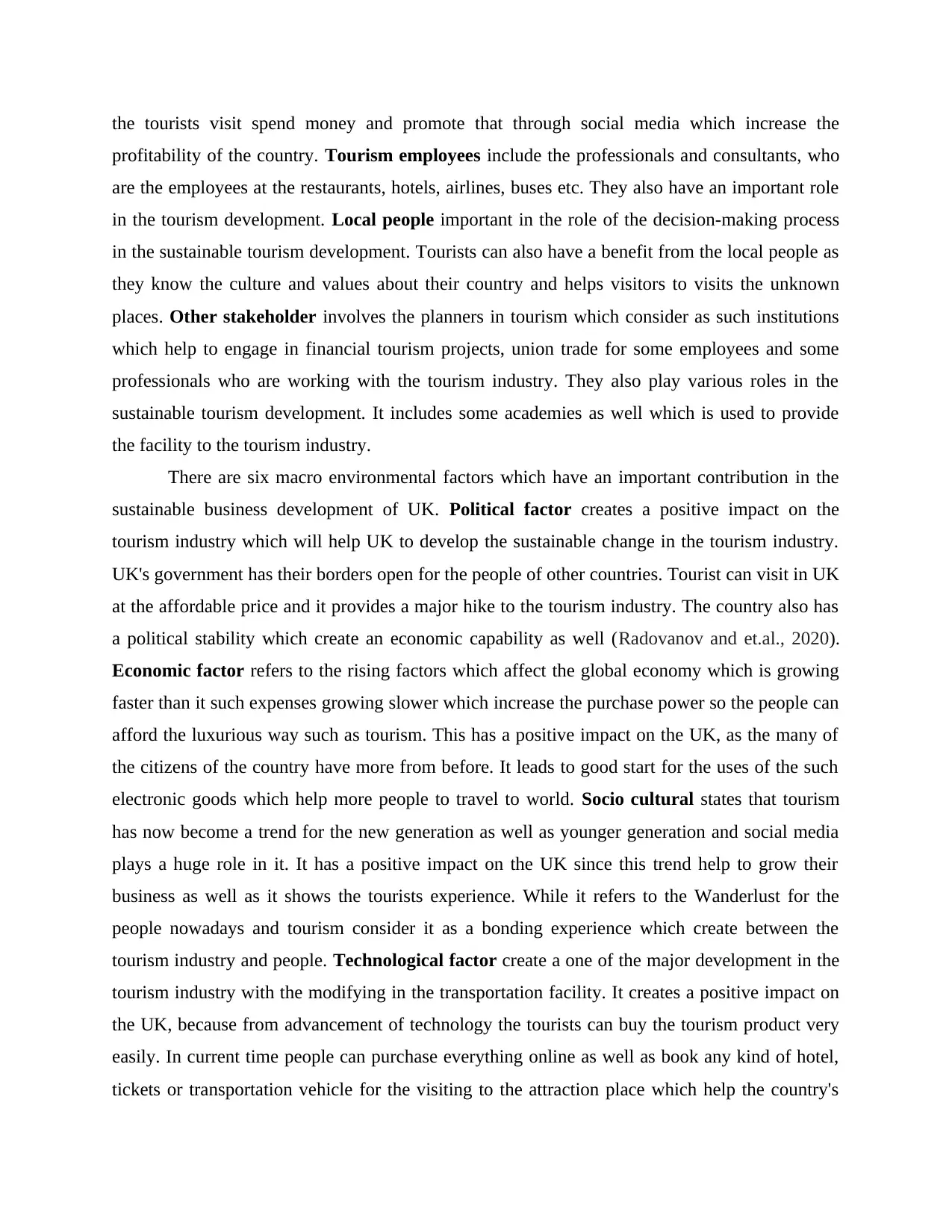
the tourists visit spend money and promote that through social media which increase the
profitability of the country. Tourism employees include the professionals and consultants, who
are the employees at the restaurants, hotels, airlines, buses etc. They also have an important role
in the tourism development. Local people important in the role of the decision-making process
in the sustainable tourism development. Tourists can also have a benefit from the local people as
they know the culture and values about their country and helps visitors to visits the unknown
places. Other stakeholder involves the planners in tourism which consider as such institutions
which help to engage in financial tourism projects, union trade for some employees and some
professionals who are working with the tourism industry. They also play various roles in the
sustainable tourism development. It includes some academies as well which is used to provide
the facility to the tourism industry.
There are six macro environmental factors which have an important contribution in the
sustainable business development of UK. Political factor creates a positive impact on the
tourism industry which will help UK to develop the sustainable change in the tourism industry.
UK's government has their borders open for the people of other countries. Tourist can visit in UK
at the affordable price and it provides a major hike to the tourism industry. The country also has
a political stability which create an economic capability as well (Radovanov and et.al., 2020).
Economic factor refers to the rising factors which affect the global economy which is growing
faster than it such expenses growing slower which increase the purchase power so the people can
afford the luxurious way such as tourism. This has a positive impact on the UK, as the many of
the citizens of the country have more from before. It leads to good start for the uses of the such
electronic goods which help more people to travel to world. Socio cultural states that tourism
has now become a trend for the new generation as well as younger generation and social media
plays a huge role in it. It has a positive impact on the UK since this trend help to grow their
business as well as it shows the tourists experience. While it refers to the Wanderlust for the
people nowadays and tourism consider it as a bonding experience which create between the
tourism industry and people. Technological factor create a one of the major development in the
tourism industry with the modifying in the transportation facility. It creates a positive impact on
the UK, because from advancement of technology the tourists can buy the tourism product very
easily. In current time people can purchase everything online as well as book any kind of hotel,
tickets or transportation vehicle for the visiting to the attraction place which help the country's
profitability of the country. Tourism employees include the professionals and consultants, who
are the employees at the restaurants, hotels, airlines, buses etc. They also have an important role
in the tourism development. Local people important in the role of the decision-making process
in the sustainable tourism development. Tourists can also have a benefit from the local people as
they know the culture and values about their country and helps visitors to visits the unknown
places. Other stakeholder involves the planners in tourism which consider as such institutions
which help to engage in financial tourism projects, union trade for some employees and some
professionals who are working with the tourism industry. They also play various roles in the
sustainable tourism development. It includes some academies as well which is used to provide
the facility to the tourism industry.
There are six macro environmental factors which have an important contribution in the
sustainable business development of UK. Political factor creates a positive impact on the
tourism industry which will help UK to develop the sustainable change in the tourism industry.
UK's government has their borders open for the people of other countries. Tourist can visit in UK
at the affordable price and it provides a major hike to the tourism industry. The country also has
a political stability which create an economic capability as well (Radovanov and et.al., 2020).
Economic factor refers to the rising factors which affect the global economy which is growing
faster than it such expenses growing slower which increase the purchase power so the people can
afford the luxurious way such as tourism. This has a positive impact on the UK, as the many of
the citizens of the country have more from before. It leads to good start for the uses of the such
electronic goods which help more people to travel to world. Socio cultural states that tourism
has now become a trend for the new generation as well as younger generation and social media
plays a huge role in it. It has a positive impact on the UK since this trend help to grow their
business as well as it shows the tourists experience. While it refers to the Wanderlust for the
people nowadays and tourism consider it as a bonding experience which create between the
tourism industry and people. Technological factor create a one of the major development in the
tourism industry with the modifying in the transportation facility. It creates a positive impact on
the UK, because from advancement of technology the tourists can buy the tourism product very
easily. In current time people can purchase everything online as well as book any kind of hotel,
tickets or transportation vehicle for the visiting to the attraction place which help the country's
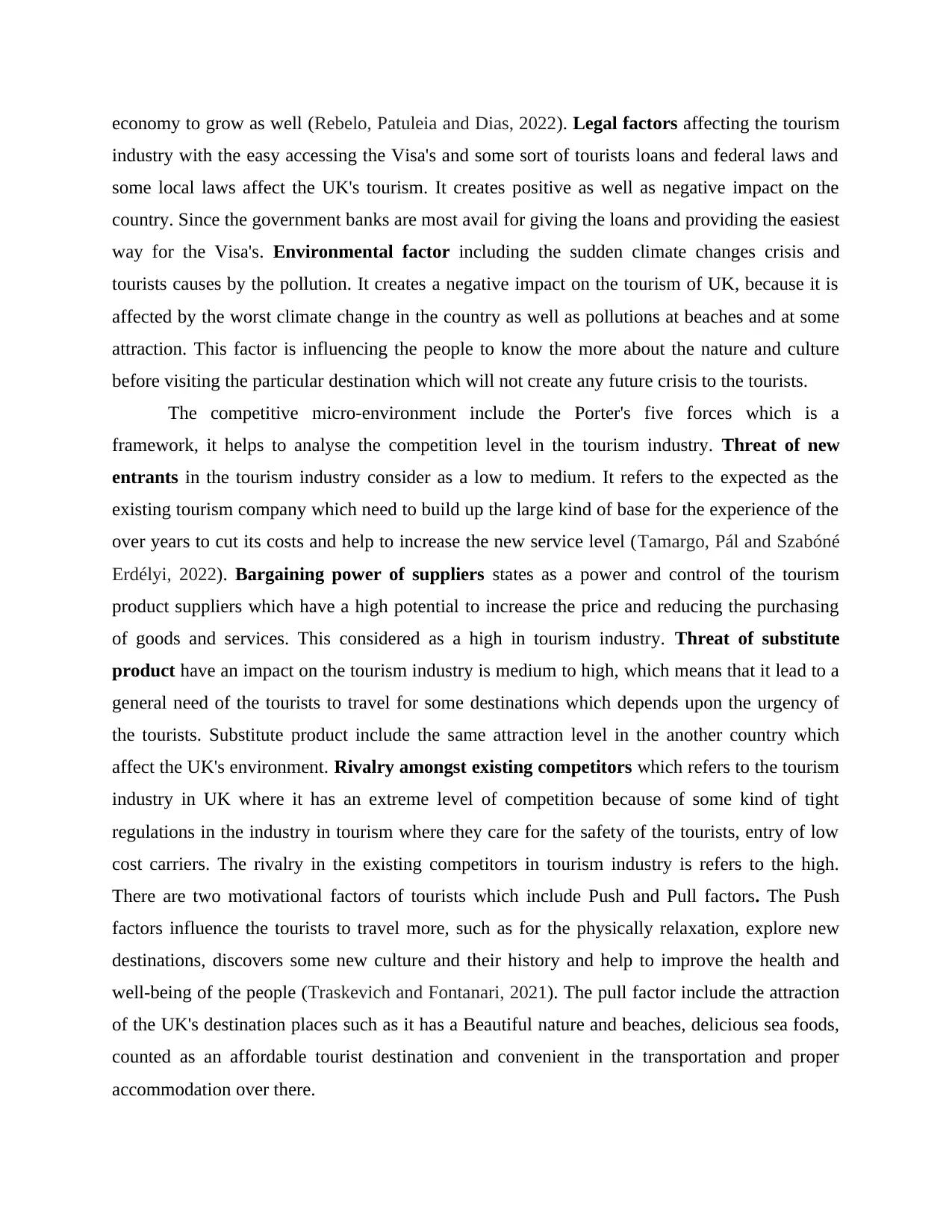
economy to grow as well (Rebelo, Patuleia and Dias, 2022). Legal factors affecting the tourism
industry with the easy accessing the Visa's and some sort of tourists loans and federal laws and
some local laws affect the UK's tourism. It creates positive as well as negative impact on the
country. Since the government banks are most avail for giving the loans and providing the easiest
way for the Visa's. Environmental factor including the sudden climate changes crisis and
tourists causes by the pollution. It creates a negative impact on the tourism of UK, because it is
affected by the worst climate change in the country as well as pollutions at beaches and at some
attraction. This factor is influencing the people to know the more about the nature and culture
before visiting the particular destination which will not create any future crisis to the tourists.
The competitive micro-environment include the Porter's five forces which is a
framework, it helps to analyse the competition level in the tourism industry. Threat of new
entrants in the tourism industry consider as a low to medium. It refers to the expected as the
existing tourism company which need to build up the large kind of base for the experience of the
over years to cut its costs and help to increase the new service level (Tamargo, Pál and Szabóné
Erdélyi, 2022). Bargaining power of suppliers states as a power and control of the tourism
product suppliers which have a high potential to increase the price and reducing the purchasing
of goods and services. This considered as a high in tourism industry. Threat of substitute
product have an impact on the tourism industry is medium to high, which means that it lead to a
general need of the tourists to travel for some destinations which depends upon the urgency of
the tourists. Substitute product include the same attraction level in the another country which
affect the UK's environment. Rivalry amongst existing competitors which refers to the tourism
industry in UK where it has an extreme level of competition because of some kind of tight
regulations in the industry in tourism where they care for the safety of the tourists, entry of low
cost carriers. The rivalry in the existing competitors in tourism industry is refers to the high.
There are two motivational factors of tourists which include Push and Pull factors. The Push
factors influence the tourists to travel more, such as for the physically relaxation, explore new
destinations, discovers some new culture and their history and help to improve the health and
well-being of the people (Traskevich and Fontanari, 2021). The pull factor include the attraction
of the UK's destination places such as it has a Beautiful nature and beaches, delicious sea foods,
counted as an affordable tourist destination and convenient in the transportation and proper
accommodation over there.
industry with the easy accessing the Visa's and some sort of tourists loans and federal laws and
some local laws affect the UK's tourism. It creates positive as well as negative impact on the
country. Since the government banks are most avail for giving the loans and providing the easiest
way for the Visa's. Environmental factor including the sudden climate changes crisis and
tourists causes by the pollution. It creates a negative impact on the tourism of UK, because it is
affected by the worst climate change in the country as well as pollutions at beaches and at some
attraction. This factor is influencing the people to know the more about the nature and culture
before visiting the particular destination which will not create any future crisis to the tourists.
The competitive micro-environment include the Porter's five forces which is a
framework, it helps to analyse the competition level in the tourism industry. Threat of new
entrants in the tourism industry consider as a low to medium. It refers to the expected as the
existing tourism company which need to build up the large kind of base for the experience of the
over years to cut its costs and help to increase the new service level (Tamargo, Pál and Szabóné
Erdélyi, 2022). Bargaining power of suppliers states as a power and control of the tourism
product suppliers which have a high potential to increase the price and reducing the purchasing
of goods and services. This considered as a high in tourism industry. Threat of substitute
product have an impact on the tourism industry is medium to high, which means that it lead to a
general need of the tourists to travel for some destinations which depends upon the urgency of
the tourists. Substitute product include the same attraction level in the another country which
affect the UK's environment. Rivalry amongst existing competitors which refers to the tourism
industry in UK where it has an extreme level of competition because of some kind of tight
regulations in the industry in tourism where they care for the safety of the tourists, entry of low
cost carriers. The rivalry in the existing competitors in tourism industry is refers to the high.
There are two motivational factors of tourists which include Push and Pull factors. The Push
factors influence the tourists to travel more, such as for the physically relaxation, explore new
destinations, discovers some new culture and their history and help to improve the health and
well-being of the people (Traskevich and Fontanari, 2021). The pull factor include the attraction
of the UK's destination places such as it has a Beautiful nature and beaches, delicious sea foods,
counted as an affordable tourist destination and convenient in the transportation and proper
accommodation over there.
⊘ This is a preview!⊘
Do you want full access?
Subscribe today to unlock all pages.

Trusted by 1+ million students worldwide
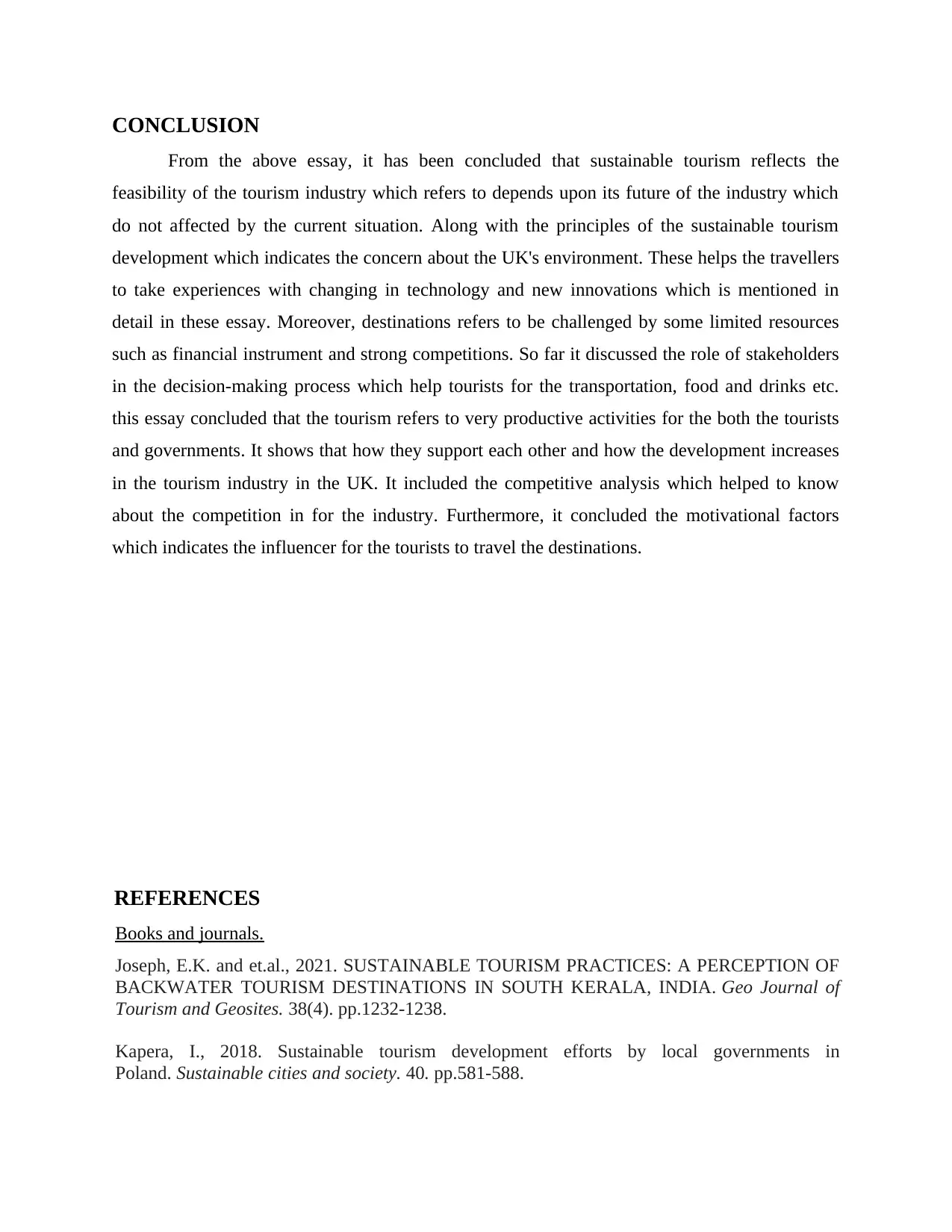
CONCLUSION
From the above essay, it has been concluded that sustainable tourism reflects the
feasibility of the tourism industry which refers to depends upon its future of the industry which
do not affected by the current situation. Along with the principles of the sustainable tourism
development which indicates the concern about the UK's environment. These helps the travellers
to take experiences with changing in technology and new innovations which is mentioned in
detail in these essay. Moreover, destinations refers to be challenged by some limited resources
such as financial instrument and strong competitions. So far it discussed the role of stakeholders
in the decision-making process which help tourists for the transportation, food and drinks etc.
this essay concluded that the tourism refers to very productive activities for the both the tourists
and governments. It shows that how they support each other and how the development increases
in the tourism industry in the UK. It included the competitive analysis which helped to know
about the competition in for the industry. Furthermore, it concluded the motivational factors
which indicates the influencer for the tourists to travel the destinations.
REFERENCES
Books and journals.
Joseph, E.K. and et.al., 2021. SUSTAINABLE TOURISM PRACTICES: A PERCEPTION OF
BACKWATER TOURISM DESTINATIONS IN SOUTH KERALA, INDIA. Geo Journal of
Tourism and Geosites. 38(4). pp.1232-1238.
Kapera, I., 2018. Sustainable tourism development efforts by local governments in
Poland. Sustainable cities and society. 40. pp.581-588.
From the above essay, it has been concluded that sustainable tourism reflects the
feasibility of the tourism industry which refers to depends upon its future of the industry which
do not affected by the current situation. Along with the principles of the sustainable tourism
development which indicates the concern about the UK's environment. These helps the travellers
to take experiences with changing in technology and new innovations which is mentioned in
detail in these essay. Moreover, destinations refers to be challenged by some limited resources
such as financial instrument and strong competitions. So far it discussed the role of stakeholders
in the decision-making process which help tourists for the transportation, food and drinks etc.
this essay concluded that the tourism refers to very productive activities for the both the tourists
and governments. It shows that how they support each other and how the development increases
in the tourism industry in the UK. It included the competitive analysis which helped to know
about the competition in for the industry. Furthermore, it concluded the motivational factors
which indicates the influencer for the tourists to travel the destinations.
REFERENCES
Books and journals.
Joseph, E.K. and et.al., 2021. SUSTAINABLE TOURISM PRACTICES: A PERCEPTION OF
BACKWATER TOURISM DESTINATIONS IN SOUTH KERALA, INDIA. Geo Journal of
Tourism and Geosites. 38(4). pp.1232-1238.
Kapera, I., 2018. Sustainable tourism development efforts by local governments in
Poland. Sustainable cities and society. 40. pp.581-588.
Paraphrase This Document
Need a fresh take? Get an instant paraphrase of this document with our AI Paraphraser
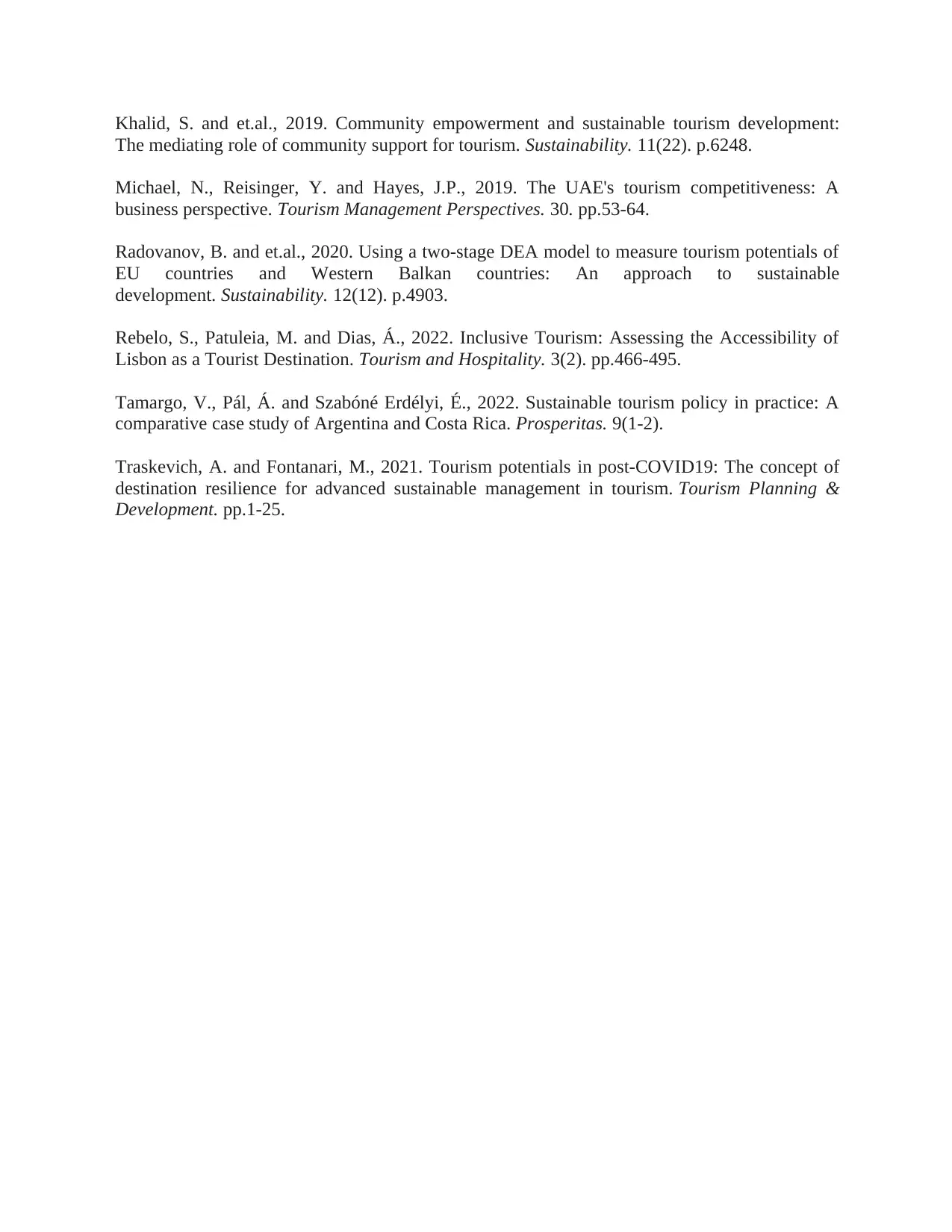
Khalid, S. and et.al., 2019. Community empowerment and sustainable tourism development:
The mediating role of community support for tourism. Sustainability. 11(22). p.6248.
Michael, N., Reisinger, Y. and Hayes, J.P., 2019. The UAE's tourism competitiveness: A
business perspective. Tourism Management Perspectives. 30. pp.53-64.
Radovanov, B. and et.al., 2020. Using a two-stage DEA model to measure tourism potentials of
EU countries and Western Balkan countries: An approach to sustainable
development. Sustainability. 12(12). p.4903.
Rebelo, S., Patuleia, M. and Dias, Á., 2022. Inclusive Tourism: Assessing the Accessibility of
Lisbon as a Tourist Destination. Tourism and Hospitality. 3(2). pp.466-495.
Tamargo, V., Pál, Á. and Szabóné Erdélyi, É., 2022. Sustainable tourism policy in practice: A
comparative case study of Argentina and Costa Rica. Prosperitas. 9(1-2).
Traskevich, A. and Fontanari, M., 2021. Tourism potentials in post-COVID19: The concept of
destination resilience for advanced sustainable management in tourism. Tourism Planning &
Development. pp.1-25.
The mediating role of community support for tourism. Sustainability. 11(22). p.6248.
Michael, N., Reisinger, Y. and Hayes, J.P., 2019. The UAE's tourism competitiveness: A
business perspective. Tourism Management Perspectives. 30. pp.53-64.
Radovanov, B. and et.al., 2020. Using a two-stage DEA model to measure tourism potentials of
EU countries and Western Balkan countries: An approach to sustainable
development. Sustainability. 12(12). p.4903.
Rebelo, S., Patuleia, M. and Dias, Á., 2022. Inclusive Tourism: Assessing the Accessibility of
Lisbon as a Tourist Destination. Tourism and Hospitality. 3(2). pp.466-495.
Tamargo, V., Pál, Á. and Szabóné Erdélyi, É., 2022. Sustainable tourism policy in practice: A
comparative case study of Argentina and Costa Rica. Prosperitas. 9(1-2).
Traskevich, A. and Fontanari, M., 2021. Tourism potentials in post-COVID19: The concept of
destination resilience for advanced sustainable management in tourism. Tourism Planning &
Development. pp.1-25.

9
⊘ This is a preview!⊘
Do you want full access?
Subscribe today to unlock all pages.

Trusted by 1+ million students worldwide
1 out of 9
Related Documents
Your All-in-One AI-Powered Toolkit for Academic Success.
+13062052269
info@desklib.com
Available 24*7 on WhatsApp / Email
![[object Object]](/_next/static/media/star-bottom.7253800d.svg)
Unlock your academic potential
Copyright © 2020–2026 A2Z Services. All Rights Reserved. Developed and managed by ZUCOL.


